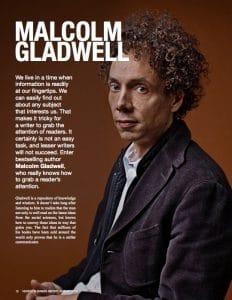16Aug2013
We live in a time when information is readily at our fingertips. We can easily find out about any subject that interests us. That makes it tricky for a writer to grab the attention of readers. It certainly is not an easy task, and lesser writers will not succeed. Enter bestselling author Malcolm Gladwell, who really knows how to grab a reader’s attention.
Gladwell is a repository of knowledge and wisdom. It doesn’t take long after listening to him to realize that the man not only is well read on the latest ideas from the social sciences, but knows how to convey those ideas in way that grabs you. The fact that millions of his books have been sold around the world only proves that he is a stellar communicator.
The Process of Sifting Through Information
So, what sort of writing process does Gladwell use? Although he admits it’s hard to describe his writing process because he doesn’t have ‘a kind of system’, what he does do is to try and expose himself to as many sources and ideas as he possibly can. “It’s truly about matching stories with ideas.” He also states that he does three other things to prepare him to put proverbial pen to paper:
• He familiarizes himself with the interesting ideas coming out of social science schools.
• He looks for stories and simple ways he can illustrate the ideas that are interesting to him.
• He spends a lot of time talking to people, and trying to understand the right approach to use in his writings to make sense of the findings.
Finding Topics That Resonate With a Mass Audience
Gladwell has a knack for picking topics that are interesting to readers all over the world. Clearly, he is a writer with sharp and smart instincts, and has cornered the market on finding topics that resonate with the general public. What can aspiring writers take away from Gladwell’s approach? Follow your own instincts. Know that you never really know if what you find interesting will be interesting to readers. A writer just has to write about what they are interested in and hope that it “overlaps with what readers are interested in.” A good writer can’t try to guess “where people are going and give them that,” i.e. do market research, but must follow their instincts.
Gladwell sees himself as someone who stands between the general public and the academic world, a sort of translator for people who live busy, complicated lives, as most of us do these days. There are many interesting ideas coming out of social science schools that the general public can benefit from, and through Gladwell’s writings busy people can discover those ideas.
Writers like Gladwell are not the only ones who must weed through vast amounts of information. There is an “overwhelming mass of information” out there in most fields. Any professional who is “engaged with the modern world” must sift through all the information out there and decide what is relevant and important.
The 10,000 Hour Rule, Or How to Become Great in Your Chosen Field
In his book, Outliers: The Story of Success, he discusses the “10,000 hour rule,” which states that it takes about 10,000 hours, roughly 10 years, of practice to become good at something. It is an idea that comes from the social sciences, and it basically is saying, in the words of Gladwell, “that in any kind of cognitively complex field, there’s a minimum amount of practice that’s necessary to achieve true expertise.” Although a person must have natural talent, without diligent practice, they will not become great in their field. The 10,000 hour rule reminds us that we can’t overlook the sheer importance that effort takes in order to achieve our goals because raw talent without practice only takes us so far.
Employers Must Be Patient with Their Staff
How much control do we actually have over our chances of success? Quite a bit, according to Gladwell. There are certain things we can do to increase our chances of being good in our chosen fields. And there are things that companies can do to help their employees succeed. They can take training and workplace development more seriously, and be patient with employees as they master difficult things. Or in the words of Gladwell: “As jobs in the workplace get more complicated, we need to expand the amount of time we use to evaluate people’s performances.”
Employers, are you listening?
Malcolm Gladwell has been a staff writer with The New Yorker magazine since 1996. Author of four world-class bestseller books, he was named one of Time Magazine’s 100 Most Influential People in 2005, and ranked #10 in Thinkers 50 list in 2011. Born in England, he grew up in Canada, and currently resides in New York City.
This article is from the August 2013 issue of Nordic Business Report. Read the full magazine here »




 by:
by: 